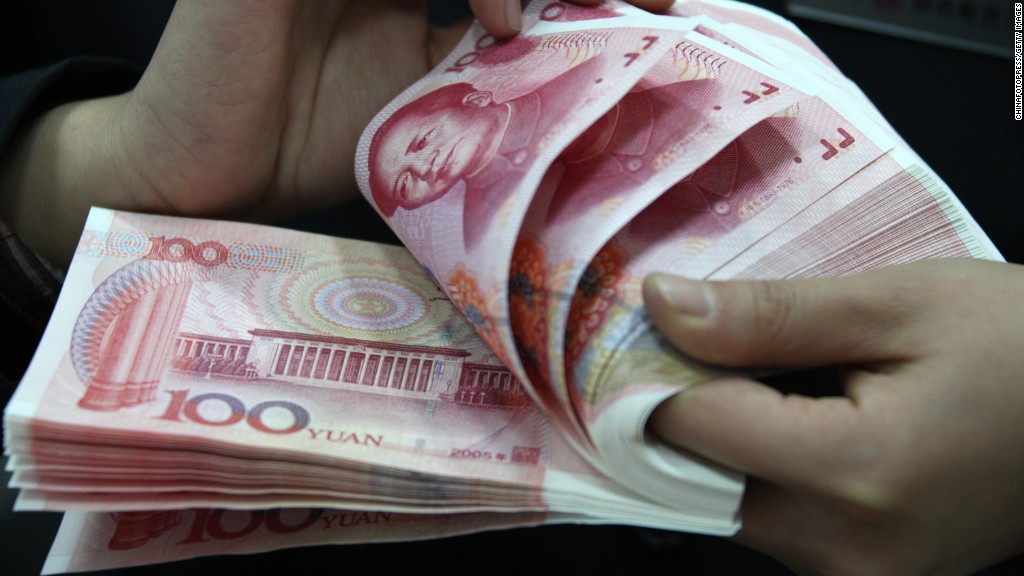
Devaluation! Deflation! Death cross! There are a lot of D words spooking investors. Wall Street is not, to paraphrase Cole Porter, delightful, delicious or de-lovely right now.
The Dow and S&P 500 fell sharply Tuesday and were down quite a bit again Wednesday morning before staging a huge comeback at the end of the day to push back into positive territory.
But the Dow is still near its lowest point of the year.
CNNMoney's Fear and Greed Index, which looks at seven indicators of market sentiment, is showing signs of Extreme Fear. It's at a level of 9 out of 100 -- and it can't get much lower.
Why are traders so nervous? Here's a quick breakdown of the market's major pressure points.
Devaluation: Remember Monday? The Dow surged nearly 250 points, a gain of 1.4%. That snapped a seven-day losing streak. Those were fun times.
They didn't last long. China stunned the world Tuesday when it announced it was devaluing its currency, the yuan.
This sent a clear signal that China is extremely worried about its economy and volatile stock market.
Related: China's yuan devaluation turns up heat on rest of Asia
When a country moves to make its currency weaker, it is usually doing so to try and boost exports. With a lower yuan, Chinese-made goods suddenly become cheaper.
Countries often benefit from a weaker currency. Japan's market has roared back to life thanks to policies that have pushed the yen lower. The weak yen has lifted profits for major exporters like Sony (SNE) and Toyota (TM).
But the weak yuan could be a big problem for U.S. companies doing big business in China -- like Apple (AAPL) and KFC owner Yum Brands (YUM). Their stocks have tanked the past two days.
China's actions are also raising fears that other nations will make similar moves to remain competitive. That could spark a trade war.
Deflation: The turmoil in China has spilled over to the global commodity markets.
Oil is hovering around a 6-year low. Copper has plunged. So have agricultural commodities like corn and wheat.

That's led to worries about deflation. And that's not good.
Lower prices for stuff may sound like it's something to cheer. But when prices fall rapidly, it can have a chilling effect on an economy. Consumers (and investors) tend to wait for prices to fall further.
Related: Global markets plunge on China fears
Central banks have typically done a good job of fighting inflation by raising interest rates. But it's a lot harder to combat deflation.
So that Federal Reserve rate hike that seemed like a given next month? It may need to get pushed out further if commodity prices continue to plunge. And that could be bad news since it seemed the market was finally prepared for rates to go up.
Death cross. No. This is not the name of a heavy metal band. (If it were, it would probably be spelled Deth Kross.) It's a technical term used to describe when the 50-day moving average falls below the 200-day moving average for an index.
In plain English, a death cross means momentum is going in the wrong direction. And the Dow hit a death cross on Tuesday. So it's time to pull an Iron Maiden and run for the hills, right? Not exactly.
The Russell 2000, an index for small companies, reached a death cross last September. And while it's been a bumpy ride for small caps since then, the Russell 2000 is still up 6% since the death cross.
BTIG chief technical strategist Katie Stockton pointed out in a note Wednesday that there have actually been several death crosses for the Dow since the current bull market began in March 2009.
Related: China is putting the Fed in a tough spot
In case you haven't noticed, we're still in a bull market.
So what's next for stocks? Investors have to hope for stabilization in the yuan and commodity prices. That could put an end to this stock slide.
What's more, the S&P 500 is still only 3% below its all-time high. It's not time to panic.
And there's a good chance that this is not actually the beginning of a trade war.
Anthony Valeri, strategist for LPL Financial, pointed out in a note Tuesday that China risks shooting itself in the foot if it lets the yuan fall a lot. It would have to kiss goodbye any hopes of making the yuan a viable alternative to the dollar and euro.
"The government appears very concerned about weakness in the Chinese economy, but devaluations of the currency are at odds with the goal of increasing the acceptance of the yuan as a global currency," Valeri wrote.
But even if stocks fall further, it's not the end of the world. Many market experts have been waiting for a correction -- a pullback of 10% from a recent peak. That hasn't happened since the fall of 2011.


